iCompton: Dre as Apple Product
 August 7th, 2015 will presumably not join January 24th, 1984 and October 23, 2001 on the list of celebrated Apple anniversaries. This will, I suspect, be a mistake. The release of Compton (all together now, “Dr. Dre’s first new album in sixteen years”) is every bit as significant a cultural moment as the Macintosh and the iPod, even if its status as a pop moment is likely to obscure its status as a moment in the history of tech culture, and, more broadly, the way it positions Dre as the king of both Compton and Cupertino, for good and for ill.
August 7th, 2015 will presumably not join January 24th, 1984 and October 23, 2001 on the list of celebrated Apple anniversaries. This will, I suspect, be a mistake. The release of Compton (all together now, “Dr. Dre’s first new album in sixteen years”) is every bit as significant a cultural moment as the Macintosh and the iPod, even if its status as a pop moment is likely to obscure its status as a moment in the history of tech culture, and, more broadly, the way it positions Dre as the king of both Compton and Cupertino, for good and for ill.
The album is, after all, an Apple product, even if it says Aftermath/Interscope on the label. Because, of course, there wasn’t a physical label when the album was released: it was an Apple Music/iTunes Store exclusive. This is part and parcel of Dr. Dre’s newfound status as Apple executive, as was the album’s announcement, just a week before its release, on Dre’s Beats One show.
The theatricality of that move is not the only thing borrowed from Steve Jobs. Dre is working in the same role of renowned visionary overseer that Jobs occupied in his later years. Dre’s albums have always been intensely collaborative affairs, but on Compton he is less the lead artist than the CEO, serving as the drummer for decades of hip hop talent, from Ice Cube to Kendrick Lamar, to march to. Beats by Dre, if you will.
In this regard too, Dre is following in Jobs’s footsteps, with Apple’s 2014 acquisition of Beats by Dre being made in the model of its 1997 acquisition of NeXT. In 1997 they sought both to use NeXTSTEP to make up for years of stalled and inadequate modernisation of MacOS and to (re)acquire the services of Steve Jobs. In 2014, the platform past due for modernization was the iTunes Store, the acquired technology was the Beats Music service, and the executive talent was Dre.
Central to this process is the fact that Dre functions as a luxury brand. That’s the whole point of Apple Music itself, which, for all its interface foibles, still has the sense of quality design one expects from Apple, carefully chosen and immaculately kerned typefaces over lush stock photos all combining to scream “we’re classier than Spotify” as loudly as possible. But this sense of design is just as visible in Compton. A Dre album has always demanded that it be listened with an ear trained on the quality and innovation of the production. It has to be a smash hit also, but its true audience is the engaged connoisseur. With its collage of 70s funk and analogue synths, 1992’s The Chronic hinted to listeners that hip-hop’s most formidable power wasn’t revolutionary rhetoric or gun love, but a particular poise of laid-back confidence; seven years later, 2001 was a victory lap featuring the era’s top names paying Dre tribute, demonstrating the immeasurable material payoff of his approach
Or, to put it in terms of the tech buzzword du jour, Dre has always been curatorial, presenting new sounds and artists to the world so as to carefully cultivate an image as the ultimate in tastemakers.…

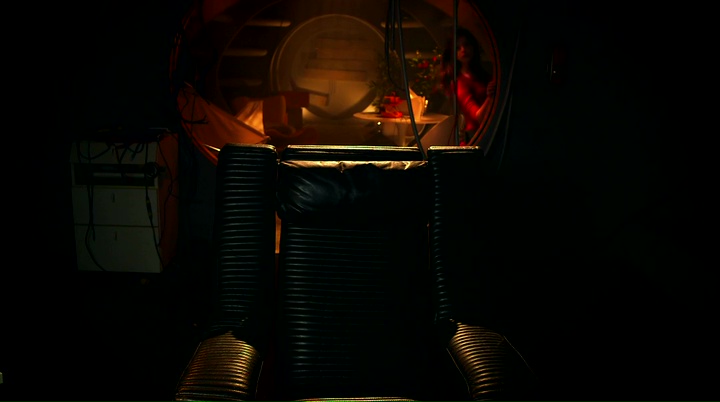 “The Chair Agenda” refers to the symbolic use of a Chair to indicate a process of Ascension. But this rather begs the question of what we mean by “ascension” and what, if anything, chairs have to do with it. I mean, it’s not like there’s anything about chairs in of themselves that would lead us to associate them with Ascension, is there?
“The Chair Agenda” refers to the symbolic use of a Chair to indicate a process of Ascension. But this rather begs the question of what we mean by “ascension” and what, if anything, chairs have to do with it. I mean, it’s not like there’s anything about chairs in of themselves that would lead us to associate them with Ascension, is there?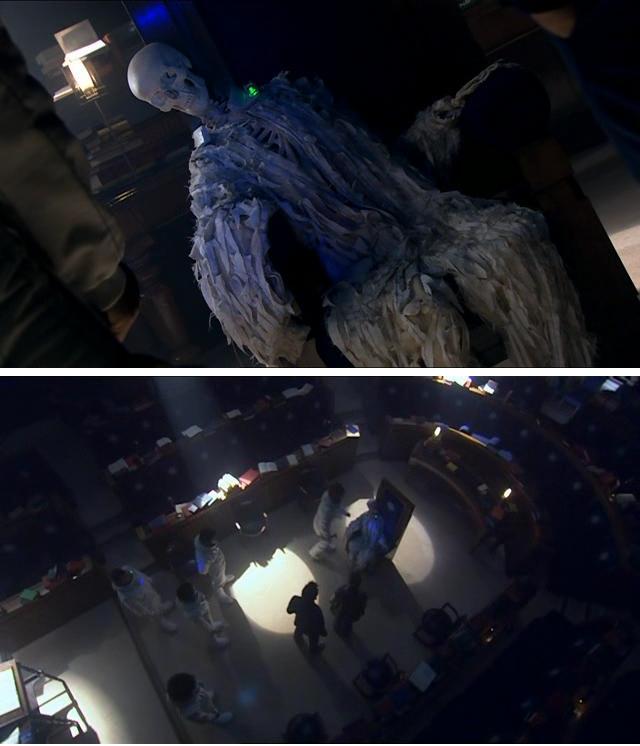 We start with the Library, because it’s in the Library that Doctor Who first starts to make use of this symbolism relatively unambiguously. In the first episode, Silence in the Library, we get the first death of the story, that of Miss Evangelista (oooh, what a name!) She wanders into a reading room, where several chairs take the center stage, and one in particular looks almost like a throne, with upholstery in TARDIS blue. The camera pans behind the chair, behind some books… and then a scream. Our heroes come racing into the room, and discover a skeleton sitting in the high-backed chair.
We start with the Library, because it’s in the Library that Doctor Who first starts to make use of this symbolism relatively unambiguously. In the first episode, Silence in the Library, we get the first death of the story, that of Miss Evangelista (oooh, what a name!) She wanders into a reading room, where several chairs take the center stage, and one in particular looks almost like a throne, with upholstery in TARDIS blue. The camera pans behind the chair, behind some books… and then a scream. Our heroes come racing into the room, and discover a skeleton sitting in the high-backed chair. A little while ago, I said that I would write an essay of at least 1000 words, on any topic, for the first person to ask for one after I passed 500 followers on Twitter. I reached that milestone (hey, to me it’s a milestone) and immediately two people asked me simultaneously. One of them asked me to write about Kate Bush. So here goes.
A little while ago, I said that I would write an essay of at least 1000 words, on any topic, for the first person to ask for one after I passed 500 followers on Twitter. I reached that milestone (hey, to me it’s a milestone) and immediately two people asked me simultaneously. One of them asked me to write about Kate Bush. So here goes.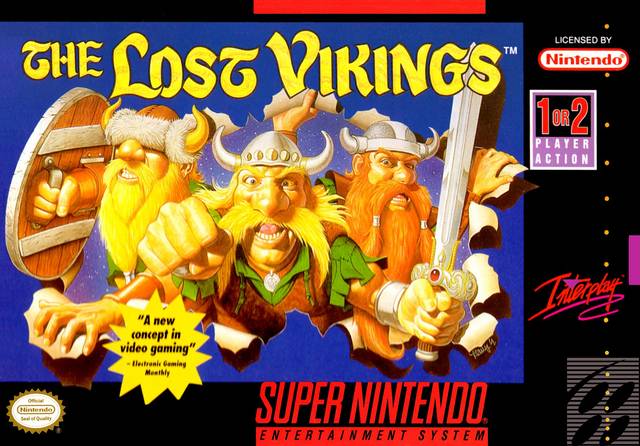 They are, in truth, not lost, although they have gone far more astray than even Vinland. Were one to locate it on a map of genre, it would rest near
They are, in truth, not lost, although they have gone far more astray than even Vinland. Were one to locate it on a map of genre, it would rest near 
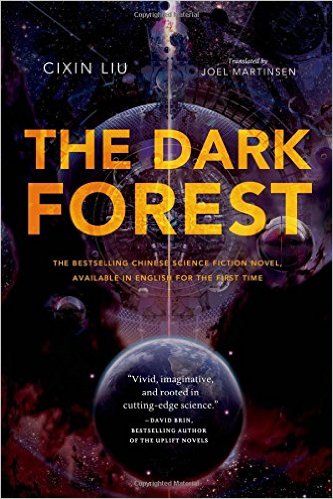 The Dark Forest by Cixin Liu
The Dark Forest by Cixin Liu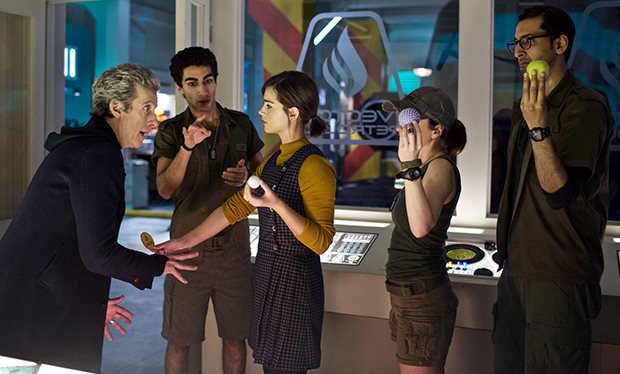 It’s tempting to call it ruthlessly traditional
It’s tempting to call it ruthlessly traditional  Welcome to Shabtober everybody.
Welcome to Shabtober everybody. _001-001.jpg)
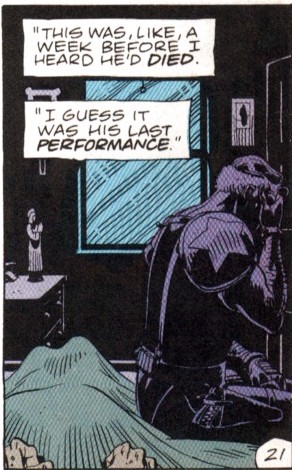 – indeed, Morrison had been hyping it since 2009, describing it as rooted in “that sort of crystalline, self-reflecting storytelling method” and an attempt to capture what would happen “if Alan Moore and Dave Gibbons had pitched the Watchmen now, rooted in a contemporary political landscape, but with the actual Charlton characters instead of analogues.” In this regard, what is perhaps most significant about it is that it is not an imitation of Watchmen as such. Where many comics overtly following from Watchmen adopt its nine panel grid, Pax Americana is based around an eight panel grid, albeit significantly more loosely than Watchmen is around its grid. This is in turn reflected within the comic, which uses the figure eight as a recurring visual motif. But Morrison slyly plays on the image, using it not just to represent the number 8, but as an infinity symbol, a figure that tacitly invokes Doctor Manhattan’s line shortly before the end of Watchmen, “nothing ever ends.”
– indeed, Morrison had been hyping it since 2009, describing it as rooted in “that sort of crystalline, self-reflecting storytelling method” and an attempt to capture what would happen “if Alan Moore and Dave Gibbons had pitched the Watchmen now, rooted in a contemporary political landscape, but with the actual Charlton characters instead of analogues.” In this regard, what is perhaps most significant about it is that it is not an imitation of Watchmen as such. Where many comics overtly following from Watchmen adopt its nine panel grid, Pax Americana is based around an eight panel grid, albeit significantly more loosely than Watchmen is around its grid. This is in turn reflected within the comic, which uses the figure eight as a recurring visual motif. But Morrison slyly plays on the image, using it not just to represent the number 8, but as an infinity symbol, a figure that tacitly invokes Doctor Manhattan’s line shortly before the end of Watchmen, “nothing ever ends.”_001-002.jpg)